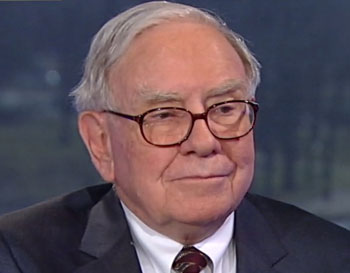 Berkshire Hathaway (BRK.A) (BRK.B) Chairman and CEO Warren Buffet wrote in his eagerly anticipated annual letter to shareholders, released Saturday, that the conglomerate’ s book value increased 19.8% last year, gaining $21.8 billion in net worth. Over the last 45 years (that is, since present management took over)
Berkshire Hathaway (BRK.A) (BRK.B) Chairman and CEO Warren Buffet wrote in his eagerly anticipated annual letter to shareholders, released Saturday, that the conglomerate’ s book value increased 19.8% last year, gaining $21.8 billion in net worth. Over the last 45 years (that is, since present management took over)
Berkshire’s book value has grown from $19 to $84,487, a rate of 20.3% compounded annually, the letter said. With Berkshire Class A shares closing on Friday at $119,800, the PPS is certainly trading above year end book value of $84,487. Buffet also wrote that the company had net income of $8.06 billion, or $5,193 per share in 2009.
In aggregate, our businesses are worth considerably more than the values at which they are carried on our books. In our all-important insurance business, moreover, the difference is huge. Even so, Charlie [Munger] and I believe that our book value – understated though it is – supplies the most useful tracking device for changes in intrinsic value.
Mr. Buffett made a specific comment to Berkshire’s property-casualty (P/C) insurance business, calling it “the engine behind Berkshire’s growth.”
“It has worked wonders for us”, he wrote. We carry our P/C companies on our books at $15.5 billion more than their net tangible assets, an amount lodged in our “Goodwill” account. These companies, however, are worth far more than their carrying value – and the following look at the economic model of the P/C industry will tell you why.
On the question of why Berkshire issued shares to pay for part of the Burlington Northern Santa Fe Corp. (BNI) acquisition, Buffett said that “the selling shareholders quite properly evaluated our offer at $100 per share.”
The cost to us, however, was somewhat higher since 40% of the $100 was delivered in our shares, which Charlie and I believed to be worth more than their market value. Fortunately, we had long owned a substantial amount of BNSF stock that we purchased in the market for cash. All told, therefore, only about 30% of our cost overall was paid with Berkshire shares.
In the end, Charlie and I decided that the disadvantage of paying 30% of the price through stock was offset by the opportunity the acquisition gave us to deploy $22 billion of cash in a business we understood and liked for the long term. It has the additional virtue of being run by Matt Rose, whom we trust and admire. We also like the prospect of investing additional billions over the years at reasonable rates of return. But the final decision was a close one. If we had needed to use more stock to make the acquisition, it would in fact have made no sense. We would have then been giving up more than we were getting.
Mr. Buffett also addressed in his letter — regarded as one of the most important and informative bodies of work ever written in the business and investing world — the fact that companies must develop harsh penalties for greedy executives who get into trouble with risky investments.
[emphasis added]“In my view a board of directors of a huge financial institution is derelict if it does not insist that its CEO bear full responsibility for risk control”, Buffett wrote. “If he’s incapable of handling that job, he should look for other employment. And if he fails at it – with the government thereupon required to step in with funds or guarantees –the financial consequences for him and his board should be severe.
It has not been shareholders who have botched the operations of some of our country’s largest financial institutions. Yet they have borne the burden, with 90% or more of the value of their holdings wiped out in most cases of failure. Collectively, they have lost more than $500 billion in just the four largest financial fiascos of the last two years. To say these owners have been “bailed-out” is to make a mockery of the term.
The CEOs and directors of the failed companies, however, have largely gone unscathed. Their fortunes may have been diminished by the disasters they oversaw, but they still live in grand style. It is the behavior of these CEOs and directors that needs to be changed: If their institutions and the country are harmed by their recklessness, they should pay a heavy price – one not reimbursable by the companies they’ve damaged nor by insurance. CEOs and, in many cases, directors have long benefitted from oversized financial carrots ; some meaningful sticks now need to be part of their employment picture as well.“
Full Text: Warren Buffett’s Annual Letter to Shareholders 2009
- Bulenox: Get 45% to 91% OFF ... Use Discount Code: UNO
- Risk Our Money Not Yours | Get 50% to 90% OFF ... Use Discount Code: MMBVBKSM
Disclaimer: This page contains affiliate links. If you choose to make a purchase after clicking a link, we may receive a commission at no additional cost to you. Thank you for your support!


Leave a Reply